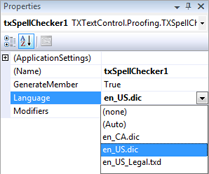Using Hunspell Dictionaries from OpenOffice.org in TX Spell .NET
One of the principal advantages of TX Spell .NET is the direct support of the freely available Hunspell dictionaries from OpenOffice.org. In our TX Spell .NET Dictionaries section, you can download the tested and verified dictionaries. The Hunspell dictionaries with the file extension *.oxt are actually ZIP files. In order to use those OXT files, change the extension to ZIP and unzip the archive. Typically, the OXT contains a Dictionary file (en_US.dic) and an Affix file (en_US.aff). Those…

One of the principal advantages of TX Spell .NET is the direct support of the freely available Hunspell dictionaries from OpenOffice.org.
In our TX Spell .NET Dictionaries section, you can download the tested and verified dictionaries. The Hunspell dictionaries with the file extension *.oxt are actually ZIP files. In order to use those OXT files, change the extension to ZIP and unzip the archive. Typically, the OXT contains a Dictionary file (en_US.dic) and an Affix file (en_US.aff). Those files can be directly loaded in TX Spell .NET.
The verified dictionaries in our download section are already prepared and packaged as ZIP files.
In order to load this dictionary, it must be added to the DictionaryCollection. There are two ways to load this dictionary.
Using the Language Property
-
Copy both files (dic and aff) to the default dictionary folder:
Default: C:\Program Files\Text Control GmbH\TX Spell 2.0 .NET for Windows Forms\Assembly\Dictionaries\
Or, when you deploy your application, a Dictionaries subfolder of your application's root directory.
-
In Visual Studio, the dictionary can be selected using the Language property in the Properties window at design-time:

Adding Dictionaries Dynamically
-
Copy both files (dic and aff) to the default dictionary folder.
-
Set the Language property to (none).
-
Now, a new OpenOfficeDictionary can be created and added to the DictionaryCollection dynamically:
TXTextControl.Proofing.OpenOfficeDictionary ooDic = new TXTextControl.Proofing.OpenOfficeDictionary("en_US.dic"); txSpellChecker1.Dictionaries.Add(ooDic);The parameter of the OpenOfficeDictionary constructor specifies the path for the Hunspell OpenOffice.org dictionary dic file. Using only the dictionary file name without a directory path, the corresponding dictionary file from the default dictionary folder will be used.
Related Posts
Service Pack 1 for TX Spell .NET 7.0 Released
We are very happy to announce the immediate availability of new Service Packs for all TX Spell .NET 7.0 products.
Proofing Tools Available As ReportingCloud Web API Endpoints
We just rolled out 3 new ReportingCloud endpoints to integrate spell checking functionality to your cloud-based applications in more than fifty languages.
HyphenationServerTextControlSpell Checking
Using TX Spell .NET with ServerTextControl
TX Spell .NET comes with a core assembly and separate assemblies for the Win32 platforms Windows Forms and WPF. When using TX Spell .NET with the non-UI version of TX Text Control…
HTML5: Enable Spell Checking Using Javascript
IMPORTANT: This feature is now part of the JavaScript API: Javascript: TXTextControl.isSpellCheckingEnabled property ? TX Text Control .NET Server ? JavaScript API ? TXTextControl Object ?…
Web.TextControl and Spell Checking
In combination with the spell checking component TX Spell .NET for Windows Forms (with ASP.NET support), spell checking can be easily added to web-based applications created with TX Text Control…

